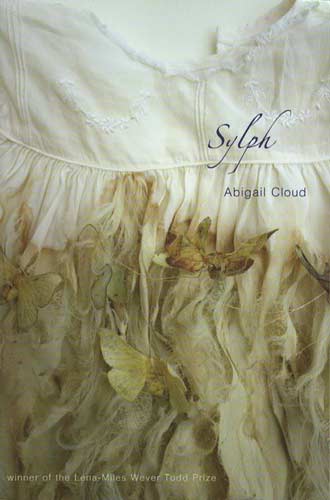Sylph
The poems in Sylph, Abigail Cloud’s debut collection, are comprised of multiple balancing acts. They are graceful, self-assured poems, beautifully executed with a tightly focused imagistic sensibility. But they are also searching, inquisitive poems—their arrivals are real-time events, self-discoveries. They have an airy quality, as the title of the collection would suggest (there are “wings” everywhere), yet are also deeply rooted in the material world. They are as at-home in myth and the spirit world, or the haunting voices in archives, as they are in the garden and in the home. The poems in Sylph, Abigail Cloud’s debut collection, are comprised of multiple balancing acts. They are graceful, self-assured poems, beautifully executed with a tightly focused imagistic sensibility. But they are also searching, inquisitive poems—their arrivals are real-time events, self-discoveries. They have an airy quality, as the title of the collection would suggest (there are “wings” everywhere), yet are also deeply rooted in the material world. They are as at-home in myth and the spirit world, or the haunting voices in archives, as they are in the garden and in the home.
The collection is broken into an even four sections—“Prologue,” “Black Act,” “White Act,” and “Apothèose”—and throughout there are groups of related poems that form little subsections. There is a series of poems on Italy, a series on asylums, a series of character poems (such as “Bonnie Parker, After the Second Heist” or “Ginger, at 3 a.m.”) and, perhaps most notable, a cycle of “Demon” poems, as in “Needle Prick Demon,” “The Demon of Untraceable Scents,” and “The Everyday Demon Experiences Burn-Out.”
Threading these cycles together are poems with more one-off subjects, and this is an important point with this collection: each poem, whether part of a larger cycle or independent, is its own project, taking up its title as a serious and focused concern. The poems here quite directly address their titles and stay focused on them. The poems pursue their titles. The poems want to open their titles up. Take, for example, the meditative focus in “Broken Jar Demon”:
Stop—a slurry of flashes,
fingers crisp with parsley
and the sudden absence,a violent gap. How
the synapse connects,
a splinter of fear in the nail-bed.
As a result of this kind of focus, the speakers shift a lot across these poems, and the poet only emerges indirectly, through habits, gestures, and compulsions. There is an “I” present, but it could equally be the “I” of a persona, as in “Choked Peppermint Demon”: “My father stuffed / socks into vacuum / hoses. Mother / squeezed swimmers / breathless. But / I need sudden panic of air.” Or, the “I” could be the poet herself, as in “Postcards for My Mother, Galleria Borghese”:
I would run like she did
but I could never be a tree,
feet dead to summer.
My fingers are never
still and my hair has always
loved the wind.
What’s more, there are just as many Shes: “She knew there would be mock / goodnights, a fractional vocabulary.” (“Tryst”) And just as many Yous: “What is bone? Bread in your body. A core—the ground. Words that speak all the time of a yellowing of dream, its truth running to black and splintering. It’s sharp and you can’t remember why.” (“Bones”) These perpetually blur speaker with interlocutor, private thought with public address.
The imagistic sense is likewise cast between poles, at once impressionistic and incisive, acute, sometimes almost microscopic. One of my favorite acute gazes is in “Before the Glass Slipper”:
Ashes aren’t so bad—
Cleaner than dirt, and softer.
White in the center
Where the filth is burned
Out. I am good. Some
shrivel like shells
or cherry blossoms.
Moments like these, for their focus, the domesticity and the nervy sense of torment, definitely remind me of Sylvia Plath. The sense of listening and responding to legacies is palpable, whether the backdrop of the myth of Daphne and Apollo, or the asylum stories cracked open from the archives, or even more direct addresses, such as to opera singer Maria Callas: “I dream your voice into my body, / your sound thin fibers in the text / of me.” (“Dancer’s Poem for Callas”)
But these poems are nonetheless of a decidedly realized voice, one that investigates its subjects with a daggering rhythm of statement and rest, statement and rest:
I loved you in a chest of drawers. I loved
you while the creeping mallows stretched
and ebbed. Out on the ice, a silent cave.
I could not wait for your eyes to open. Today,
the lavender rotted in its patch. The thundercracked this tree.
(“Sylphide”)
Cloud, in lines like these and many others, offers an energetic, lush world where myth, history, and the voices of others intertwine in the poet’s immediate, material world. These are poems in which scene is charged, pregnant with natural and metaphysical force. And the poet is there in it all, at once rendering it and beholding it. I’ll close with one of the most affecting stanzas, from “Letter to a Suicidal Man:”
I look through the window and see
you sitting on the edge of the bed.
I know it will have somethingto do with water. I will let yougo, the way the light sweatsthrough the glass and sinksdown the curtains this morning.





